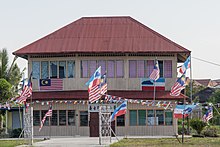Weston (Sabah)
| Weston | ||
|---|---|---|
|
|
||
| Coordinates | 5 ° 13 ' N , 115 ° 36' E | |
| Basic data | ||
| Country | Malaysia | |
| Sabah | ||
| ISO 3166-2 | MY-12 | |
| height | 8 m | |
| Residents | 2000 | |
| founding | 1896 | |
|
Entrance to Weston
|
||
Weston is a small town in the Malaysian state of Sabah , about 100 kilometers south of Kota Kinabalu . Weston belongs to the Beaufort District in the Interior Division . Weston was named after Arthur J. West, a railroad engineer with the North Borneo Chartered Company .
history
The original name of the settlement was Sugin Lawas . When the North Borneo Chartered Company took place as the terminus of the railway line to Beaufort in operation, it was in honor of the railway engineer Arthur J. West in West Town renamed, which later became the modern name Weston was.
When the first railway section was built in the 1890s, William Clarke Cowie had chosen the site in the mouth of the Padas River as a seemingly suitable port for the shipping of natural rubber and tobacco . However, it soon became apparent that the harbor was too shallow for larger ships. Weston's importance waned when the railway line was extended to Jesselton in 1906 .
Weston was one of the ports used by the Japanese Army to invade northern Borneo. From Weston, the Japanese troops first moved to Beaufort and from there transported some of their troops by rail to Jesselton, which was occupied by the Japanese from January 6, 1941. For the Australian 9th Division, Weston was one of the starting points for the liberation of North Borneo. On June 19, 1945, Weston was captured by Allied forces.
When the Brunei Revolt broke out in Brunei on December 8, 1962 , the rebellion quickly spread across the border to Limbang , Laws and Miri in Sarawak and Weston and Sipitang in northern Borneo, as these places were traditionally linked to the Sultanate. With the swift and determined intervention of the British Governor, Sir William Goode, the rebels in Sipitang and Weston were isolated and disarmed just two days later. On December 10, a total of 60 rebels were arrested in Weston and a large number of weapons were confiscated.
The train service between Beaufort and Weston was finally shut down in 1963.
Historic architecture
Weston is one of the towns along the west coast whose historical buildings have disappeared with a few exceptions. The following buildings have been preserved from the time before the Second World War:
- a shop,
- the Chinese School Sekolah Cina Che Hwa and , built in 1932
- the jetty where the first section of the North Borneo Railway ended.
Demographics
According to population statistics from 2010, the city has 334 inhabitants, mostly Malays (72%). The remaining inhabitants of Weston - about 1700 people - are distributed among the surrounding villages and settlements.
Flora and fauna
Parts of the mouth of the Padas River are protected as Weston Wetland Park (WWP) . The wetland is one of the largest estuarine biotopes in North Borneo. The wet habitat is a retreat for proboscis monkeys .
Infrastructure
Weston is close to the A2 ( Pan Borneo Highway ).
See also
literature
- KG Tregonning: A History Of Modern Sabah (North Borneo 1881–1963) , 2nd edition, University of Malaya Press, Kuala Lumpur, 1965, reprint 1967.
- Owen Rutter: British North Borneo - An Account of its History, Ressources and Native Tribes , Constable & Company Ltd, London, 1922.
- WH Treacher: British Borneo - Sketches of Brunai, Sarawak, Labuan and North Borneo , Singapore, Government print department, 1891.
Individual evidence
- ↑ Tregonning, p 57
- ↑ Tregonning, p. 216
- ↑ Tregonning, p 221
- ↑ Revolt in Brunei ( page no longer available , search in web archives ) Info: The link was automatically marked as defective. Please check the link according to the instructions and then remove this notice. . The Straits Times , December 10, 1962 issue, p. 10
- ↑ Harun Abdul Maji: REBELLION IN BRUNEI - The 1962 Revolt, Imperialism, Confrontation and Oil , 2007, IBTauris & Co Ltd, London, page 129, ISBN 978-1-84511-423-7
- ↑ Census 2010 for Sabah (PDF file; 1.8 MB), ed. from the Bureau of Statistics, Malaysia
Web links
- Wetland and Ecotourism Weston in Sabah (Borneo), East Malaysia (PDF file; 1.5 MB), study by the LaSalle School, Likas, Kota Kinabalu





